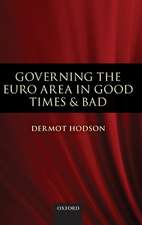Contradictions and Limits of Neoliberal European Governance: From Lisbon to Lisbon
Editat de J. Drahokoupil, L. Hornen Limba Engleză Hardback – 27 noi 2008
| Toate formatele și edițiile | Preț | Express |
|---|---|---|
| Paperback (1) | 387.58 lei 6-8 săpt. | |
| Palgrave Macmillan UK – 2009 | 387.58 lei 6-8 săpt. | |
| Hardback (1) | 391.61 lei 6-8 săpt. | |
| Palgrave Macmillan UK – 27 noi 2008 | 391.61 lei 6-8 săpt. |
Preț: 391.61 lei
Nou
Puncte Express: 587
Preț estimativ în valută:
74.94€ • 77.42$ • 62.37£
74.94€ • 77.42$ • 62.37£
Carte tipărită la comandă
Livrare economică 26 martie-09 aprilie
Preluare comenzi: 021 569.72.76
Specificații
ISBN-13: 9780230537095
ISBN-10: 023053709X
Pagini: 297
Ilustrații: XVIII, 297 p.
Dimensiuni: 140 x 216 x 23 mm
Greutate: 0.5 kg
Ediția:2009
Editura: Palgrave Macmillan UK
Colecția Palgrave Macmillan
Locul publicării:London, United Kingdom
ISBN-10: 023053709X
Pagini: 297
Ilustrații: XVIII, 297 p.
Dimensiuni: 140 x 216 x 23 mm
Greutate: 0.5 kg
Ediția:2009
Editura: Palgrave Macmillan UK
Colecția Palgrave Macmillan
Locul publicării:London, United Kingdom
Cuprins
Introduction: Towards a Critical Political Economy of European Governance PART I: THE NATURE AND LIMITS OF THE EUROPEAN NEOLIBERAL PROJECT The Contradictions of 'Embedded Neoliberalism' and Europe's Multi-level Legitimacy Crisis: the European Project and its Limits; B.van Apeldoorn Neoliberal European Governance and the Politics of Welfare State Retrenchment: A Critique of the New Malthusians; M.Ryner Geopolitics and Neoliberalism: U.S. Power and the Limits of European Autonomy; A.Cafruny PART II: CASE STUDIES OF EUROPEAN SOCIO-ECONOMIC REGULATION Global Finance and the European Economy: The Struggle over Banking Regulation; H.-J.Bieling & J.Jäger 'New Europeans' for the 'New European Economy': Citizenship and the Lisbon Agenda; S.Hager Organic Intellectuals at Work? The High Level Group of Company Law Experts in European Corporate Governance Regulation; L.Horn PART III: THE WIDENING OF NEOLIBERAL GOVERNANCE: TRANSNATIONAL CAPITALISM IN CENTRAL AND EASTERN EUROPE Corporate Tax Reform in Neoliberal Europe: East Central Europe as a Template for Deepening the Neoliberal European Integration Project? A.Vliegenthart & H.Overbeek Race to the Bottom? Transnational Companies and Reinforced Competition in the Enlarged European Union; D.Bohle The Rise of the Competition State in the Visegrád Four: Internationalization of the State as a Local Project; J.Drahokoupil PART IV: CONTESTING NEOLIBERAL GOVERNANCE: RESISTING RESTRUCTURING IN NATIONAL AND TRANSNATIONAL ARENAS A National Case-study of Embedded Neoliberalism and its Limits: The Dutch Political Economy and the 'No' to the European Constitution; B.van Apeldoorn Globalization and Regional Integration: The possibilities and Problems for Trade Unions to Resist Neo-liberal Restructuring in Europe; A.Bieler
Recenzii
'This is an outstanding collection which captures like no other current work the deeper causes of the continuing quagmire of European integration. Covering the period from the European Council's 2000 Lisbon agreement to the rejection of the Constitution and Irish no to the Lisbon treaty, it highlights the inherent problems of neoliberal regulation as applied by the EU. With several chapters devoted to the latest round of enlargement to Central and Eastern Europe, the book powerfully demonstrates the limits of one-sided financial regulation and social downsizing. Written by specialists who in no way can be suspected of an anti-European agenda, the book is testimony to what a progressive, pluralist approach to the study of integration can achieve.' - Kees van der Pijl, University of Sussex, UK
'Focusing on social struggles over the hegemony of the European project, this edited volume takes stock of the politics of neo-liberal restructuring in the European Union since the Lisbon Summit. The contributors provide convincing analyses of the bias towards liberalisation inherent in the European Integration process, but also point towards emerging contestation, countermovements and the potential for European re-regulation. Anyone with an interest in the state of affairs of European politics at the intersection of International Political Economy and Comparative Political Economy should not miss this important contribution.' - Martin Höpner, Max Planck Institute for theStudy of Societies, Germany
'... what makes this such a strong collection is the authors' attention to the economic dimension, since capitalist contradictions demand a constant reconfiguration of 'institutionalized compromise' both within the hegemonic bloc of social forces and between them and the rest. The clarity and originality of the analysis featured here deserves the widest study.' Michael Keaney, Metropolia Business School, Vantaa, Finland, Political Studies Review
'As Jessop highlights, what makes this such a strong collection is the authors' attention to the economic dimension, since capitalist contradictions demand a constant reconfiguration of 'institutionalized compromise' (p.viii) both within the hegemonic bloc of social forces and between them and the rest. The clarity and originality of the analysis featured here deserves the widest study. - Micheal Keaney, Political Studies Review
'Focusing on social struggles over the hegemony of the European project, this edited volume takes stock of the politics of neo-liberal restructuring in the European Union since the Lisbon Summit. The contributors provide convincing analyses of the bias towards liberalisation inherent in the European Integration process, but also point towards emerging contestation, countermovements and the potential for European re-regulation. Anyone with an interest in the state of affairs of European politics at the intersection of International Political Economy and Comparative Political Economy should not miss this important contribution.' - Martin Höpner, Max Planck Institute for theStudy of Societies, Germany
'... what makes this such a strong collection is the authors' attention to the economic dimension, since capitalist contradictions demand a constant reconfiguration of 'institutionalized compromise' both within the hegemonic bloc of social forces and between them and the rest. The clarity and originality of the analysis featured here deserves the widest study.' Michael Keaney, Metropolia Business School, Vantaa, Finland, Political Studies Review
'As Jessop highlights, what makes this such a strong collection is the authors' attention to the economic dimension, since capitalist contradictions demand a constant reconfiguration of 'institutionalized compromise' (p.viii) both within the hegemonic bloc of social forces and between them and the rest. The clarity and originality of the analysis featured here deserves the widest study. - Micheal Keaney, Political Studies Review
Notă biografică
ANDREAS BIELER is Professor of Political Economy and Fellow of the Centre for the Study of Social and Global Justice (CSSGJ) in the School of Politics and International Relations, University of Nottingham, UK. HANS-JÜRGEN BIELING is Junior Professor for European integration at the Department of Political Science at Philipps University Marburg, Germany. DOROTHEE BOHLE is Associate Professor of Political Science at Central European University, Budapest. ALAN W. CAFRUNY is Henry Platt Bristol Professor of International Affairs at Hamilton College, USA. JAN DRAHOKOUPIL is a research fellow at the Max Planck Institute for the Study of Societies in Cologne, Germany. SANDY BRIAN HAGER is a PhD candidate in the Department of Political Science at York University in Toronto, Canada. LAURA HORN is a PhD candidate in the Department of Political Science at the Vrije Universiteit Amsterdam, the Netherlands. JOHANNES JÄGER is Head of the Economics Department at the University of Applied Sciences BFI Vienna, Austria. HENK OVERBEEK is Professor of International Relations at the Vrije Universiteit, Amsterdam, the Netherlands. MAGNUS RYNER is Professor of International Relations at Oxford Brookes University, UK. ARJAN VLIEGENTHART studied political science and history at the Vrije Universiteit (Amsterdam) and the Freie Universität (Berlin), Germany.











